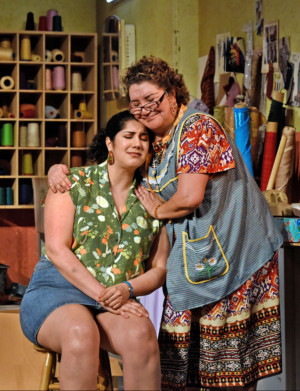Review: REAL WOMEN HAVE CURVES at Dallas Theatre Center

All words I can think of to describe this show feel cheap and unworthy of capturing this incredible play. Dallas Theatre Center's Real Women Have Curves is indeed about female empowerment and the immigrant experience- but more importantly, it's about sisterhood. It's about the way women interact with each other, talk about themselves, tear each other down and build each other up again. It is the most comprehensive and truly robust work of art having to do with this subject that I've ever seen. This show displays the many joys, sorrows, and complexities of the female experience. Most importantly of all, it shows us the many relationships we have with each other- as sisters, mothers, and friends- that transcend cultural and ethnic lines. It also shows us the importance of wisdom gained from ideas as well as experience.
Estela (Jamie Rezanour) owns a struggling garment factory in Los Angeles in the 1980s, with four women (including her mother and sister) working for her. Everyone has an Estela in their lives- someone who is ambitious, genuine, and maybe a little boy-crazy. Everything about Rezanour's performance was authentic. The burden of carrying both debt and the livelihood of her employees was palpable. Though she could be intense about getting work done quickly and properly, she was far from being a hardened character. Rezanour's portrayal of Estela embodied grit, and all the sweat and sacrifice that come with it.
No one in the show made you laugh more than Carmen, played by Blanca Araceli. This woman was hysterical. Everything from prodding the others to eat more, to wondering aloud about a possible pregnancy, to talking about the realities of married life reminded you that this woman isn't just an example of a Mexican mother, she is just like all mothers all over the world. Despite being the eldest of the group, Carmen was always the one to incite mischief- often in the form of chisme. The changes that came over Araceli's face, whether it was turning bright red in a bout of laughter, or taking on a look of worried concern over a date gone wrong, had the audience totally enraptured. Blanca Araceli is a true treasure in the Dallas theatre world.
The feisty Ana (Tatiana Lucia Gantt) was the firebrand of the show. Smart, idealistic, and occasionally brash, she pushed the other women to consider new ideas, and new ways of living as women. Though her idealism and lack of real-world experience leads her to be insensitive to the realities of life for the other women, her spunk is catching. Ana's aspirations to be a writer allow the audience to get treated to her private thoughts, read (and shouted!) aloud by her as she scrawls them in a notebook. Gantt's intensity and enthusiasm are exactly what you'd expect from a young and ambitious (if naïve) young woman, looking to buck the system. Most impressive of all was the sheer energy Gantt displayed in every moment of her performance.
Pancha and Rosali (Gloria Vivica Benavides and Vanessa DeSilvio, respectively) rounded out the five women in Estela's factory. The two complemented each other well- Pancha as the tough, aggressive one, and Rosali as the petite and sensitive woman. Benavides' Pancha was formidable- she perfectly executed the role of the tough, no-nonsense woman who puts up an emotional wall. Despite her tough exterior, she cares about the other women and pitches in to get the work done amid extenuating circumstances. Rosali, on the other hand, avoids confrontation and is generally cheerful- except when it comes to the subject of her weight. DeSilvio's performance as Rosali was agreeable throughout the show until the other women confronted her about her diet- and then a fierce and defensive woman emerged. This actress did an excellent job of showing us that this winsome character was not as one-dimensional as we would have initially thought.
The set of Real Women Have Curves was phenomenal. The vast majority of the show took place in Estela's factory, which was filled with sewing machines, dresses, and even had a kitchenette and a bathroom. The meticulous detail did not go unnoticed- during moments designed to show a time lapse, the hands of the small clock on the wall moved rapidly to show the passing hours. If it's possible for a set to steal the show, that's exactly what happened in the last 5 minutes of the performance. As a fashion show was taking place, the factory disappeared to reveal a colorful, dream-like display that embody the ideal of magical realism. Lit with hues of blue and pink, and filled with a magnificent figure of La Virgen de Guadalupe, flowers, and a massive agave, the set was an innovative masterpiece.
The costume design in this show was likewise excellent. All outfits worn in the factory were exactly what you might expect to see in the 80s, ranging from Ana's extreme careless attire to Rosali's cute, colorful outfits. The costumes worn during the fashion show at the end were extravagant and bold- and fitting for each woman who wore them. Though the extravagance used for the last moments of the show was unnecessary for the plot, I am so pleased that Dallas Theatre Center put so much work into creating such a lavish scene. It allowed the show to end on a perfect note- Knowing the women were working together, being successful, and not sacrificing one ounce of their femininity or Mexican heritage in order to do so.
Director Christie Vela put together a show with so many delicate, sensitive, and hysterical moments so perfectly. Though this show captured a whole array of issues, be they part of the female, immigrant, or just plain human experience, it never felt like "too much." It felt like every day life. Real Women Have Curves is an absolute must-see. Don't miss it!
Photo Credit: Karen Almond
Reader Reviews

Videos
